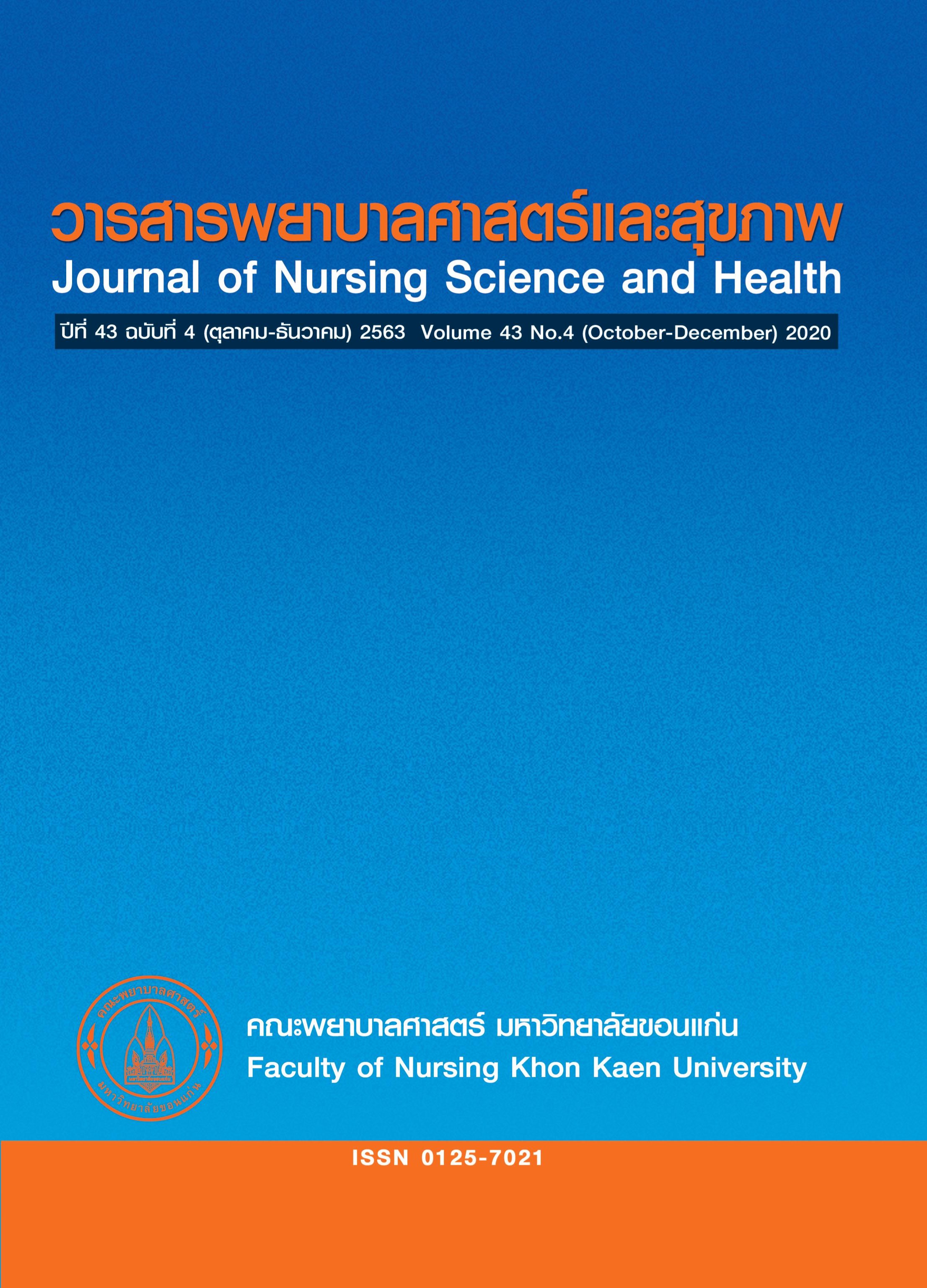ผลของโปรแกรมการจัดการตนเองต่อความรู้ พฤติกรรมการจัดการตนเองและระดับน้ำตาลสะสมในเลือดของผู้ป่วยเบาหวานที่ไม่สามารถควบคุมระดับน้ำตาลในเลือดได้: การทดลองแบบสุ่มชนิดมีกลุ่มควบคุม
คำสำคัญ:
การจัดการตนเอง, ความรู้, พฤติกรรมการจัดการตนเอง, ระดับน้ำตาลสะสมในเลือด, ผู้ป่วยโรคเบาหวานบทคัดย่อ
การวิจัยเชิงทดลองแบบสุ่มชนิดมีกลุ่มควบคุมนี้มีวัตถุประสงค์เพื่อศึกษาผลของโปรแกรมการจัดการตนเองต่อความรู้ พฤติกรรมการจัดการตนเอง และระดับน้ำตาลสะสมในเลือดของผู้ป่วยเบาหวานที่ไม่สามารถควบคุมระดับน้ำตาลในเลือดได้ กลุ่มตัวอย่างเป็นผู้ป่วยเบาหวานที่ไม่สามารถควบคุมระดับน้ำตาลในเลือดได้จำนวน 64 คน โดยกลุ่มทดลอง 32 คน ได้รับโปรแกรมการจัดการตนเองภายใต้กรอบแนวคิดของแคนเฟอร์ และกลุ่มควบคุม 32 คน ได้รับการพยาบาลตามปกติ วิเคราะห์ข้อมูลด้วยสถิติเชิงพรรณนา การทดสอบไคสแควร์ การทดสอบค่าทีแบบกลุ่มตัวอย่างไม่เป็นอิสระต่อกัน (paired t-test) และการทดสอบค่าทีแบบกลุ่มตัวอย่างเป็นอิสระต่อกัน (independent t-test) ผลการศึกษาพบว่า หลังได้รับโปรแกรมกลุ่มทดลองมีคะแนนความรู้และพฤติกรรมการจัดการตนเองสูงกว่าก่อนได้รับโปรแกรม และสูงกว่ากลุ่มควบคุมอย่างมีนัยสำคัญทางสถิติ (p<0.05) ระดับน้ำตาลสะสมในเลือดของกลุ่มทดลองต่ำกว่าก่อนได้รับโปรแกรม และต่ำกว่ากลุ่มควบคุมอย่างมีนัยสำคัญทางสถิติ (p<0.05)
เอกสารอ้างอิง
International Diabetes Federation. Diabetes situation. [Internet]. 2019 [cited 2019 Jan 16]. Available from https://www.diabetesatlas.org/ upload/resources/2019/IDF_Atlas_9th_ Edition_2019.pdf
Strategy and Planning Group Bureau of Non-communicable Diseases, Department of Disease Control. Thailand National NCD plan. [Internet]. 2018 Mar [cited 2019 Nov 20]. Available from:http://www.thaincd.com /2016/mediadetail.php?id=13065&tid=30&tid=&gid=1-015-005
Meerat W, Jenjaiwit P. Quality development of family management support services among diabetes mellitus patients at a community hospital. Journal of Nursing Science & Health 2013; 36(3): 66-71. (in Thai)
Beran D. The impact of health system on diabetes care in low and lower middle income contries. Current diabetes report 2015;15(4):20.
Tosuksri W. Internal medicine nursing. 4th ed. Bangkok: Textbook Project, Faculty of Nursing Mahidol University; 2016. (in Thai)
Chonnabot Hospital. Medical record statistics of clinical patients with diabetes report 2017. Khon Kaen: Statistic department Chonnabot; 2017. (in Thai)
Kongsakul S. The effect of a skill training program on self-management towards self-management behaviors in controlling diabetes and blood sugar levels of those who with type 2 diabetes. [thesis]. Bangkok: Faculty of Nursing Thammasat University; 2009. (in Thai)
Weangnon S, Nantsupawat W, Hornboontherm P. Effects of self-management program on behaviors for controlling disease and he¬moglobin A1C level in patients with diabetes mellitus type 2. Journal of Nurses’ Association of Thailand, North-Eastern Division 2010; 28(4):5-14. (in Thai)
Rattanapitak U, Nuwat K, Srivichitkamol A, Wiphawattana J. The result of self-diabetes management program on knowledge behavior and health index in people type 2 diabetes. Journal of Nursing Science 2013;31(1):6-18. (in Thai)
Buathongkhamwisat P, Pinchaleaw D, Moolsart S. The effectiveness of self-management program in type 2 diabetes patients in ThaKo sub district, Mae Suai district, Chiang Rai province. Journal of Police Nurses 2018; 9(1):105-15. (in Thai)
Chanchai J, Wiwat M, Imami N. Diabetes learning program and self-management of people with the disease type 2 diabetes mellitus in Prachuap Khiri Khan province. Journal of Public Health, Burapha University 2010;7(2):69-83.
Kanfer FH. Self-management method: Helping people change. United States of America: Pergamon; 1980.
Wattana C. Self-management support: Strategies for promoting disease control. Journal of Phrapokklao Nursing College 2015;26(1):117-27. (in Thai)
Glass, GV, Mcgraw B, Smith ML. Meta-analysis in social research. Beverly hill: Sage publication; 1981.
Arun J. Selection of samples of patients admitted to the hospital at a specified time. Journal of Health Science 2004;13:713.
Kanglee K. Factors associated with blood glucose control of the Type 2 diabetes Phramongkutklao hospital. Journal of Royal Thai Army Nurses 2014;15(3):256-66. (in Thai)
Schulz KF, Altman DG, Moher D. CONSORT 2010 statement: Updated guidelines for reporting parallel group randomised trials. Br J Med 2010; 340: c332. doi:10.1136/bmj. c332. PMC 2844940. PMID 20332509.
Keeratiyutawon P. A self- management program for improving knowledge, self-care activities, quality of life, and glycosylated HbA1c in Thai with type 2 diabetes mellitus. [Thesis]. Bangkok: Mahidol University; 2005. (in Thai)
ดาวน์โหลด
เผยแพร่แล้ว
รูปแบบการอ้างอิง
ฉบับ
ประเภทบทความ
สัญญาอนุญาต
วารสารพยาบาลศาสตร์และสุขภาพเป็นเจ้าของลิขสิทธิ์ในการเผยแพร่ผลงานที่ตีพิมพ์ห้ามผู้ใดนำบทความที่ได้รับการตีพิมพ์ในวารสารพยาบาลศาสตร์และสุขภาพไปเผยแพร่ในลักษณะต่าง ๆ ดังนี้ การนำบทความไปเผยแพร่ออนไลน์ การถ่ายเอกสารบทความเพื่อกิจกรรมที่ไม่ใช่การเรียนการสอน การส่งบทความไปตีพิมพ์เผยแพร่ที่อื่น ยกเว้นเสียแต่ได้รับอนุญาตจากวารสารพยาบาลศาสตร์และสุขภาพ



